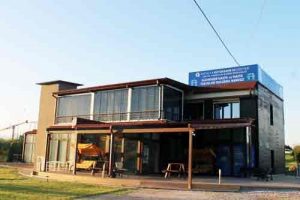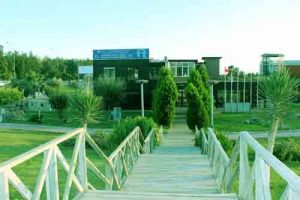Center for Aging Studies Application and Research (YAÇUMER)
Colleagues and students who would like to obtain more information about the Center for Aging Studies Application and Research (YAÇUMER) and its activities may visit the website at: http://yacumer.akdeniz.edu.tr/.
Blue House Project (May 2020 – May 2025)
Phase I: 2020–2021
Phase II: 2021–2022
Phase III: 2023–2024
Phase IV: 2024–2025
Blue House: Antalya Alzheimer Patient and Caregiver Meeting Center
Implemented between January 2016 and January 2020.
Purpose and Objectives:
Although originally conceived as a reaction to criminal activities, “Retiree-Friendly Antalya” is a project that supports active aging from a gerontological perspective. In this initiative, which is based on the idea of the “active citizen,” individuals are no longer passive victims of crime; instead, they take on an active role in combating it. In this way, social groups —including older adults— contribute directly to reducing criminal activity in Antalya and its surroundings.
Opened through the collaboration of the Antalya Metropolitan Municipality and the National Association of Social Applied Gerontology, the “Blue House – Alzheimer Patient and Caregiver Meeting Center” began service in January 2016. Many prominent figures of Antalya attended the opening ceremony led by Antalya Metropolitan Mayor Menderes TÜREL, with a large turnout from the public.
After Prof. Dr. phil. habil. İsmail TUFAN, Chair of the Akdeniz University Department of Gerontology and founding chair of the National Association of Social and Applied Gerontology, announced the establishment of the Blue House—designed according to his care model—significant public interest was observed.
What Do Antalya Residents Say About the Blue House?
M.C. (45, female):
“May God bless those who made this possible. It is a huge issue. My mother has had Alzheimer’s for three years, and I am her caregiver. I will apply to the Blue House immediately. I know where it is. It is a wonderful facility. Mayor Menderes Türel has truly initiated a project that heals our wounds. May God grant him all that he wishes.”
S. (39, male):
“Thankfully, we do not have Alzheimer’s in my family. But in our neighborhood alone there are at least three older adults with Alzheimer’s. I spoke with my colleagues at work, and they also know older adults with Alzheimer’s in their families or social circles. This is a very beneficial initiative. I sincerely congratulate everyone involved. It is one of the most meaningful projects of recent years.”
T.K. (56, female):
“My grandfather had Alzheimer’s. For now, no one in our family has it, but honestly, I am afraid. My father passed away. My mother lives alone. I divorced my husband last year. I am truly scared that my mother might develop Alzheimer’s. How would I care for her? She has no other children. There are Alzheimer’s patients around us, and their families are devastated. The Blue House project addresses a major public concern. May God bless our mayor —he really is the right person for the job!”
H.C. (67, female):
“My mother is 91 and has dementia. She lives with me. But I am not young anymore either. I have many health problems —back pain, diabetes, everything. And I am also caring for my mother. My siblings rarely visit. My poor mother no longer recognizes me. She used to be a quiet, calm woman. I was very moved when I heard about the Blue House. I hope they accept my mother so I can get some rest. If I die before she does, she will be left helpless. I pray for Mayor Menderes Bey.”


Nazilli Longevity Research
(A Project Evaluating Empirical Findings from a Gerontological Perspective)
Is aging in Nazilli a privilege? In other words, do people living in Nazilli truly live longer? Prof. Dr. phil. habil. İsmail Tufan answered this question through an analysis of data collected as part of the “Nazilli Aging Research.” This study was published as a book by Nobel Publishing as of November 1, 2016.
If you ever visit Nazilli, you will see a sign at the city entrance that reads:
“A city whose mountains yield oil, whose plains produce honey, and where long-lived people reside.”
Inspired by the work of Prof. Dr. İsmail TUFAN, this statement—commissioned by the Nazilli Municipality—is scrutinized in detail, providing empirical answers to whether aging in Nazilli truly yields more positive outcomes than in other regions.
While informing the reader about the research conducted in Nazilli, the study simultaneously provides insights into gerontology, aging, and later life by empirically comparing two groups under the categories “Residents of Nazilli” and “Non-Residents of Nazilli.”
This book serves both those interested in empirical research and those wishing to understand their own aging process.
Readers will find a brief philosophical history of aging, demographic changes in Turkey, and detailed explanations of how an empirical study is conducted—knowledge that can be applied when evaluating other research.
Agenda (October 2020 – October 2023)
Project: Turkey Gerontology Agenda 2020
Topic: Perceptions of Aging Problems Among Scientists in Turkey
Purpose and Objectives:
The Turkey Gerontology Agenda 2020 is a study conducted on a research group consisting of specialists from various fields. It was designed and executed by the Department of Gerontology at Akdeniz University, Faculty of Health Sciences. The aim was to gather information about experts’ views, plans, demands, and attitudes concerning aging, old age, and older individuals. A total of 210 experts from ten different scientific disciplines participated.
Summary:
The study is based on the life situation model and the participation paradox theory. The questions, rooted in these theoretical frameworks, aimed to determine experts’ views regarding individual and contextual competencies of older adults, their living conditions, and their willingness to participate in gerontological studies.
Results:
Statistical analyses revealed an overly positive perception of older adults among the experts. Although they appeared eager to identify gerontological problems, propose solutions, and participate in decision-making processes, they showed a negative tendency toward participation in gerontological field studies. As the experts’ age increased, their willingness to participate in work involving older adults decreased.
GeroAtlas
2000–2005 Phase I – Sponsor Supported
2005–2010 Phase II – TÜBİTAK Supported
2010–2015 Phase III – Sponsor Supported
2015–2020 Phase IV – Sponsor Supported
2020–2023 Phase V – Sponsor Supported
Topic:
Objective living conditions and subjective life experiences of older adults in Turkey.
Purpose and Objectives:
The First Turkey Gerontology Atlas was designed to determine the living conditions of older adults in Turkey, identify their causes, and provide explanations.
Summary:
As the renowned gerontologist Paul B. Baltes stated, old age has both a smiling and a crying face. Objective circumstances —the living conditions observable across various dimensions— significantly shape the appearance of old age. While objective conditions influence aging processes and quality of life, they are not sufficient on their own. Old age is also shaped by internal, subjective experiences.
The GeroAtlas© project is designed to access and evaluate both visible and invisible dimensions of aging, thereby generating valuable insights.
Results:
This study began in 2005 and will be concluded this year. Of the 3,500 participants aged 60 and over who initially took part, some are no longer with us. Through the knowledge and experiences they shared, they remain “alive” in a sense. Initial results from the analysis of their responses have begun to emerge. Since the final report will be released soon, findings will not be shared here yet. However, once published, the results will be available on our website, informing you about the objective living conditions and subjective experiences of older adults in Turkey.
Unfading Hearts
Project: Unfading Hearts (2009–2010)
(A Subproject of the Turkey Gerontology Atlas)
Topic:
Individuals aged 100 and over.
Purpose and Objectives:
Through the “Unfading Hearts” project, we aim to meet individuals aged 100 and above, explore their life worlds, listen to their life experiences, learn the conclusions they have drawn, and gain new perspectives that will benefit society.
Summary:
The phenomenon we call advanced old age has led to an increasing number of individuals aged 100 and above. This results in societies where three or even four generations coexist. Scientific findings show that life expectancy will continue to increase and that “centenarian” lives will become a social norm.
Although aging is commonly viewed as a process involving losses in productivity and competence—creating social, psychological, physical, and economic dependency—so long as this perception persists, old age will remain undervalued. Productivity and competence, however, are not limited to economic output. Despite age-related losses, we believe that older adults have much to contribute to younger generations.
This project is currently in the design phase. The start and end dates have not yet been determined. Preparatory activities such as identifying potential participants, scheduling interviews, and conducting literature reviews are ongoing.
Son güncelleme : 13.11.2025 12:11:48
